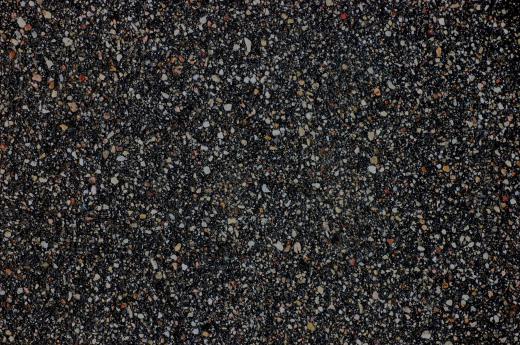Asphaltenes are a type of carbon molecule found in petroleum. This heavy, tar-like substance is often considered the bottom of the barrel, which means it is among the sludgy by-products remaining after crude oil has been distilled. To help distinguish these molecules from other oil components, scientists define asphaltenes as any petroleum product that dissolves in toulene, but doesn't dissolve in pentane or heptane solutions. Once asphaltenes undergo a refining process, they serve as a vital material in global paving operations.
While asphaltenes are always present in petroleum, they must undergo a large amount of processing before they can be extracted from the oil. After a barrel of oil has undergone distillation, the lighter or cleaner oils are sent along for further refinement and processing. The sludge by-products move on to a process known as de-asphalting. In a de-asphalter, the sludge if placed into a solvent solution to separate out the various materials. After de-asphalting, the asphaltenes are removed for additional processing, leaving behind miscellaneous oil resins, which are often used as lubricants or grease.

The asphaltenes are then subject to oxidation, which removes impurities and helps to refine these molecules. During this process, air is blown onto the asphaltene molecules to enhance their natural properties. Any impurities extracted during this process represent a form of waste, and are sent away for disposal. The remaining material can then be heated and shipped to contractors and paving companies. By mixing hot asphalt with gravel, paving crews can create blacktop roads, parking lots and runways.

Not every crude oil deposit contains the same volume of asphaltenes. Lighter, cleaner petroleum contains a smaller percentage of these molecules, which often helps to simplify distillation and refinement. Thicker and heavier oil supplies, like tar sands or oil sands generally contain the greatest proportion of asphaltenes.
Despite the many advantages these molecules offer in terms of economical and effective paving, they pose many challenges for oil crews as they work to extract petroleum from the ground. When oil is being drawn from petroleum-containing rocks, known as shale, asphaltenes and other viscous materials can clog the spaces between rocks, making it very difficult to extract oil. The same is true of traditional cased bore holes, which can easily become clogged if large quantities of asphaltenes are present. Generally, these molecules create bigger problems on sites where light oil is being drawn. They serve as less of a challenge for crews digging for oil or tar sands.
